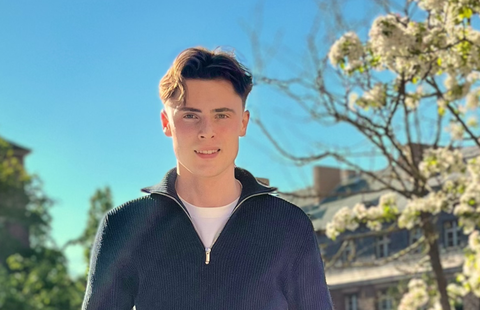May 10, 2025
Carl Seifert is the winner of the Apple Swift Student Challenge 2025
Apple's Swift Student Challenge is a programming competition that offers 1000s of student developers from all over the world the chance to put their creative ideas and programming skills into practice for a better world and develop apps to solve real-world problems. Out of 350 winners each year, 50 are ultimately recognized for their outstanding achievements in the areas of creativity, technical quality and innovation. Carl Seifert, research student at the Chair of Distributed and Networked Systems at the Faculty of Computer Science at TU Dresden, is one of the 50 "Distinguished Winners" worldwide.
For him, the Swift programming language has long been part of everyday life. "You can do so much with Swift. The source code is open and freely available. Swift supports a range of operating systems and - as a special bonus - can also be used on microcontrollers." Developing an app with it was a new incentive for him, which brought him to the Swift Student Challenge three years ago. Since then, his ideas and implementations have made him one of the most successful.
Using programming and graphic visualizations to make things understandable, was already a concern of Carl Seifert's in his school days. With his interactive apps, he wants to make lessons more vivid and tangible. They should enable students to explore and understand the subject matter more intuitively through their own practical experience.
The "ChemBuddy" app submitted for this year's challenge is an interactive and searchable periodic table for chemistry lessons. "Especially in physics and chemistry, I always had the feeling that some things weren't really intuitive. So I thought that apps could be the right way to make the whole thing more tangible." "ChemBuddy" makes it possible to get information about the respective element by tapping on it.
It is important to Carl Seifert that his apps are intuitive and invite users to use them. For him, the developer perspective and the user perspective are equally important. "Reconciling these two views was always a challenge. I think I've always spent half the time developing a user interface design where I say: yes, that's it."
He also emphasized this in the "FieldLab" and "PhysicsAssistant" apps submitted to the Swift Student Challenge in 2024 and 2023 and was recognized as one of the winners each time. With "FieldLab", charged particles can be simulated in augmented reality in electric and magnetic fields and forces can be visualized intuitively. "PhysicsAssistant" uses machine learning and natural language processing (NLP) to calculate and explain step-by-step text tasks such as "What speed must a ball with a mass of 0.3 kg reach in order to have a kinetic energy of 10 joules?". The app also offers an interactive and searchable collection of formulas.
With this year's "ChemBuddy" app, Carl Seifert is one of the 50 Distinguished Winners from around the world who will be able to experience three inspiring days at the Worldwide Developers Conference (WWDC) at Apple in Cupertino. "I am most looking forward to the contacts and the people I will meet there. Ultimately, it's also a networking event," he says happily. "The sessions at WWDC are also really interesting."
As a research student at the Chair of Distributed and Networked Systems, Carl Seifert is working on the Internet of Things, in particular on resource-limited devices that have little memory and computing capacity and are often battery-powered. Examples include Apple Watches, lighting, electronic locks and battery-powered, networked temperature sensors. To make optimal use of these microcontrollers, he is currently working on the free open source operating system RIOT, which is specially tailored to devices with low resources through modularization and layering of software.
He plans to make his three app developments for the Swift Student Challenge available to all students via the App Store in the future.

